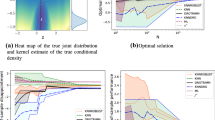Abstract
Except for a knife-edge case of preferences, the percentage error from using the change in expected consumer’s surplus (ECS) to approximate the willingness to pay for a change in the distribution of a random price is unbounded, in contrast to Willig’s (Am Econ Rev 66:589–597; 1976) famous approximation result for nonrandom prices. If the change is smooth on the space of random variables, and either the initial price is nonrandom or state-contingent payments are possible, then the change in ECS locally approximates the willingness to pay well. Unfortunately, this smoothness fails in some important applications.
Similar content being viewed by others
References
Baron D., Myerson R. (1982) Regulating a monopolist with unknown costs. Econometrica 50, 911–930
Billingsley P. (1986) Probability and measure, 2nd edn. New York, Wiley
Blundell R., Pashardes P., Weber G. (1993) What do we learn about consumer demand patterns from micro data?. Am Econ Rev 83, 570–597
Ericson W. (1969) A note on the posterior mean of a population mean. J Roy Stat Soc 31, 332–334
Graham D. (1981) Cost-benefit analysis under uncertainty. Am Econ Rev 87, 715–725
Graham D. (1992) Public expenditure under uncertainty: the net-benefit criteria. Am Econ Rev 82, 822–46
Hausman J. (1981) Exact consumer’s surplus and the deadweight loss. Am Econ Rev 71, 662–676
Lewis T., Sappington D. (1988) Regulating a monopolist with unknown demand. Am Econ Rev 78, 986–998
Li L. (1985) Cournot oligopoly with information sharing. RAND J Econ 16, 521–536
Machina M. (1982) ‘Expected utility’ analysis without the independence axiom. Econometrica 50, 277–323
Mas-colell A., Whinston M., Green J. (1995) Microeconomic theory. New York, Oxford University Press
Milgrom P., Segal I. (2002) Envelope theorems for arbitrary choice sets. Econometrica 70, 583–602
Novshek W., Sonnenschein H. (1982) Fulfilled expectations cournot duopoly with information acquisition and release. Bell J Econ 13, 214–18
Raith M. (1996) A general model of information sharing in oligopoly. J. Econ. Theory 71, 260–288
Rogerson W. (1980) Aggregate expected consumer surplus as a welfare index with an application to price stabilization. Econometrica 48, 423–436
Schlee E. (2001) The value of information in efficient risk sharing arrangements. Am Econ Rev 91, 509–524
Stennek J. (1999) The expected consumer’s surplus as a welfare measure. J Public Econ 73, 265–288
Turnovsky S., Shalit H., Schmitz A. (1980) Consumer’s surplus, price instability and consumer welfare. Econometrica 48, 135–152
Vives X. (1987) Small income effects: a Marshallian theory of consumer surplus and downward sloping demand. Rev Econ Stud 54, 87–103
Vives X. (1999) Oligopoly pricing: old ideas and new tools. Cambridge, MIT
Waugh F. (1944) Does the consumer benefit from price instability. Q J Econ 58, 589–597
Weitzman M. (1988) Consumer’s surplus as an exact approximation when prices are appropriately deflated. Q. J. Econ. 103, 543–553
Willig R.D. (1976) Consumer’s surplus without apology. Am Econ Rev 66, 589–597
Willig R.D. (1979) Consumer’s surplus without apology: Reply. Am Econ Rev 69, 467–474
Author information
Authors and Affiliations
Corresponding author
Additional information
I thank Hector Chade, Glenn Ellison, Peter Hammond, Manuel Santos, seminar participants at Arizona State, Stanford and Yale and participants of the Midwest Economic Theory meetings at Indiana University and the 2004 Summer Econometric Meetings for comments.
Rights and permissions
About this article
Cite this article
Schlee, E.E. Expected consumer’s surplus as an approximate welfare measure. Economic Theory 34, 127–155 (2008). https://doi.org/10.1007/s00199-007-0210-2
Received:
Revised:
Published:
Issue Date:
DOI: https://doi.org/10.1007/s00199-007-0210-2




